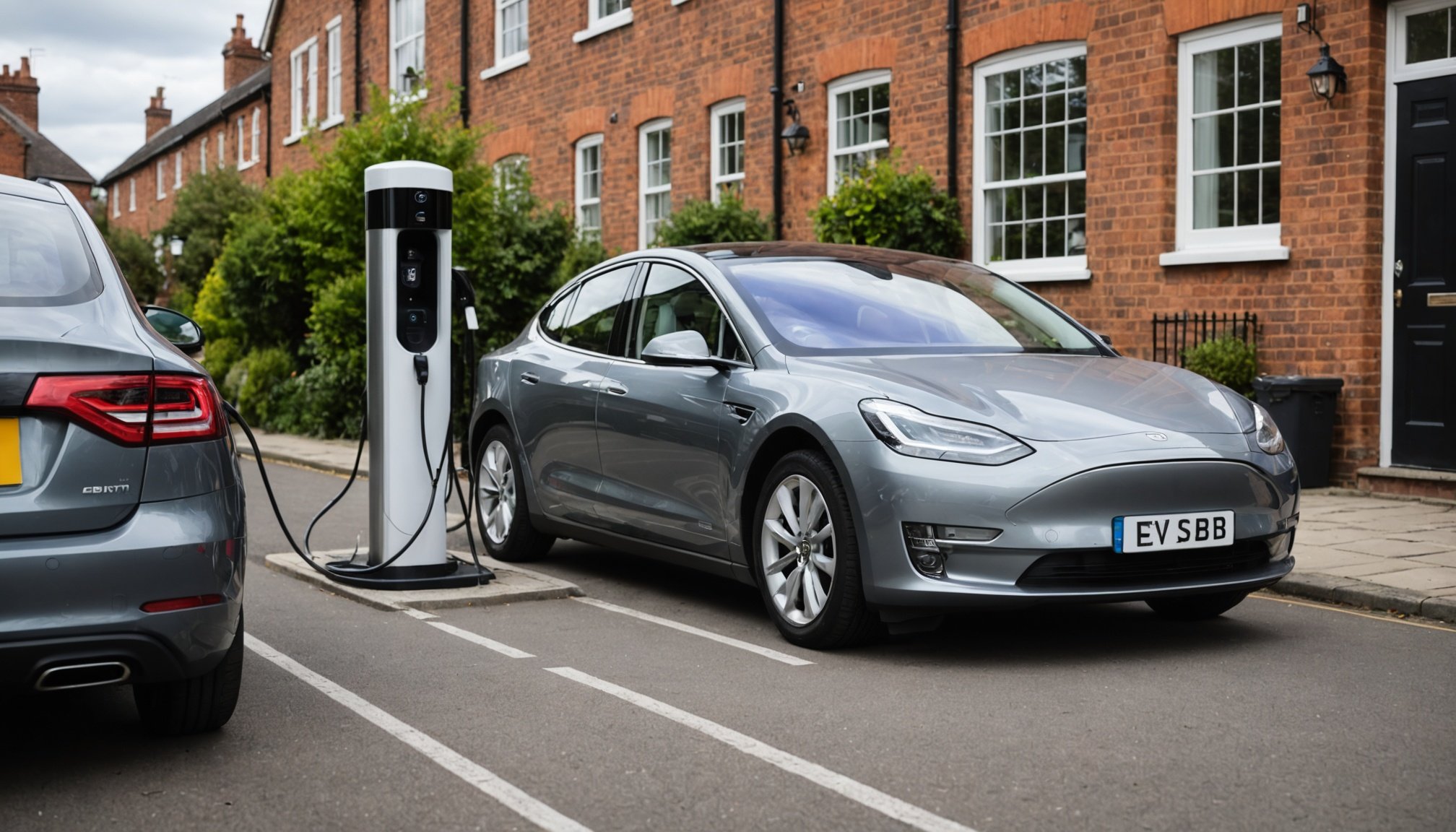Overview of Electric Vehicle Charging Stations
Understanding electric vehicle charging is crucial for UK homeowners contemplating an installation. There are several types of charging stations, each tailored for different needs.
- Level 1 Charging: This is the most basic form, using a standard household outlet. It’s simple but slow, often needing a full day for a complete charge.
- Level 2 Charging: This popular option among homeowners requires a specific installation for faster charging, typically several hours.
- DC Fast Charging: Generally found in commercial locations due to its speed and cost, it’s less likely for residential use but represents the cutting edge in charging technology.
The adoption of electric vehicles is surging in the UK due to environmental benefits and government incentives, making charging station installation highly attractive. For homeowners, these stations can lead to reduced fuel expenses, contribute positively to property value, and demonstrate a commitment to sustainability. Moreover, the ever-increasing importance of electric vehicles in the UK’s market points to a growing necessity for easy and efficient home charging options. Investing in a charging station might require upfront costs but brings long-term benefits and aligns homeowners with future transport trends.
Also to see : Maximizing returns: discover the financial benefits of converting uk commercial properties into live/work environments
Installation Costs
Embarking on an electric vehicle charging station installation involves various charging station costs. To start, homeowners should anticipate spending between £300 to £800 for basic equipment such as Level 1 chargers, while more advanced Level 2 chargers can cost anywhere from £500 to over £1,200. This equipment expense is a pivotal component of the overall investment.
Additionally, consider the installation expenses. Hiring a certified electrician is essential for safety and compliance, and labour costs typically add £200 to £500 to the overall budget. The complexity of the installation, especially in older properties, might further influence this cost.
Topic to read : Harnessing profitable opportunities: the benefits of property investment in uk enterprise zones
Several elements impact the total installation cost. Location is critical – a garage setup might be less expensive compared to outdoor installations, which may require additional weatherproofing. Upgrading your home’s electrical panel to handle the load of a Level 2 charger could also increase costs, typically ranging from £300 to £750.
Strategic planning and budgeting for these expenses ensure that homeowners are well-prepared financially, avoiding unexpected surprises during the installation process. Understanding these details empowers UK homeowners to make informed decisions about their home charging solutions.
Available Incentives and Grants
For UK homeowners, numerous financial incentives and government grants make electric vehicle charging installations more affordable. The UK government offers several programs to encourage the adoption of EV charging solutions. The Electric Vehicle Homecharge Scheme (EVHS) is a notable initiative, providing up to 75% off the cost of installing a home charging point, capped at £350. Eligibility often requires ownership of a qualifying electric vehicle and off-street parking.
Local councils may also offer additional incentives or grants. These can supplement government programs or provide aid for specific requirements. For homeowners keen on efficient applications, it’s crucial to gather all necessary documentation, including proof of vehicle ownership and compliance with parking criteria.
Applying for financial assistance often involves visiting the official government website to fill out an application form. Professional installers generally facilitate the grant application on behalf of homeowners, ensuring that all conditions are met.
Understanding the availability and application process of these incentives can significantly reduce the financial burden of installation. This not only encourages the transition to electric vehicles but also aligns with the UK’s broader sustainability goals.
Return on Investment
Investing in electric vehicle charging stations offers significant long-term benefits. Many UK homeowners are increasingly recognising these advantages, driven by both immediate convenience and broader financial gains. The ROI is greatly influenced by initial costs, usage frequency, and potential enhancements in property value. For instance, properties with readily available charging spots are perceived as more attractive in the resale market.
Consistently, expert opinions suggest that having a charging station can be a decisive factor for prospective buyers, particularly as the popularity of electric vehicles continues to surge. This trend is evident in various case studies, whereby homeowners witnessing increased property interest and value following charging station installations have reported positive financial outcomes.
Furthermore, as fuel savings from electricity over petrol accumulate, the overall utility cost impact diminishes over time, enhancing the financial return. Considering these elements, the long-term benefits of adopting charging solutions are promising. Additionally, aligning with environmentally conscious trends not only supports personal values but also adheres to evolving market demands. Stepping towards sustainable home modifications reflects a commitment to future-forward living, undeniably enhancing the property’s overall appeal.
Ongoing Maintenance Expenses
Maintaining an electric vehicle charging station involves several considerations for UK homeowners. Routine maintenance ensures optimal operation and extends the equipment’s lifespan. Regular checks should include inspecting electrical connections and cleaning of components.
Maintenance costs can vary. Simple tasks, like cleaning and inspections, are often inexpensive. However, repairs, such as replacing connectors or electrical components, may incur higher costs, typically ranging from £50 to £150 per service.
Many service providers offer maintenance plans, which could be more cost-effective over time. These plans typically include periodic inspections and repairs as needed. Comparing such plans is wise, as terms and pricing can differ significantly.
Additionally, the operational expenses are influenced by the frequency of use and weather conditions. Areas with high humidity or variability in temperature might necessitate more frequent care. Service plans can issue reminders and schedule regular checks, ensuring the charging station remains in good condition.
Choosing a reliable provider with a comprehensive service plan may alleviate potential concerns. Knowing these aspects helps homeowners budget effectively for long-term charging station ownership, ensuring they reap the benefits of their investment without encountering unwelcome costs.
Energy Savings and Costs
Deciding on home electric vehicle charging can influence your energy expenses significantly. When compared to using public stations, charging at home often results in lower energy costs. This economy springs from charging efficiency – the capability of domestic systems to optimise electricity use, reducing waste.
Home charging can yield substantial savings on fuel costs over time. For example, when electricity rates are lower than petrol prices, using a home system becomes economically advantageous. Further, recognising the importance of utility rates, particularly time-of-use tariffs, is crucial. These tariffs offer cheaper electricity during specific hours, encouraging off-peak charging. If you schedule charging during these less expensive time frames, the savings could accumulate significantly.
Examining utility plans can reveal options that align best with your charging habits. Evaluate how these plans impact overall charging costs and consider their long-term benefits. For instance, adjusting your charging routine around these tariffs can maximise savings, ultimately making home charging a practical decision for UK homeowners. Understanding the nuances of energy costs empowers you to reap the most financial benefits from your electric vehicle charging solution.
Comparisons of Residential Charging Options
Understanding home charging solutions is essential for UK homeowners aiming to make informed decisions. The difference between level 1 and level 2 charging stations is significant. Level 1 charging uses a standard 230-volt outlet, suitable for electric vehicle charging overnight due to its slow pace. In contrast, Level 2 charging requires a dedicated 240-volt outlet, offering a faster recharge, typically reducing the time needed to several hours.
When considering usage scenarios, dedicated home charging setups provide convenience and potential cost savings compared to public charging options. Home charging allows for more flexibility, such as charging during off-peak hours to benefit from reduced electricity rates. However, public stations offer the advantage of higher charge speeds with DC fast chargers, though these are less common in residential settings and tend to be more costly over time.
Consequently, choosing the right charging option depends on individual needs and circumstances. Consider factors like your daily driving range, parking setup, and budget. For those with limited driving ranges and budget constraints, Level 1 might suffice. Yet, for frequent travelers or EV enthusiasts who value quicker charging, Level 2 is often recommended for its efficiency and practicality.
Resources for Further Information
For UK homeowners exploring electric vehicle charging solutions, an array of resources can provide valuable insights and guidance.
Recommended resources include the official UK government website, which features detailed information on grants and incentives supporting charging station installations. These programs often update eligibility criteria and funding options, keeping homeowners informed and prepared.
Additionally, expert advice from respected automotive and technology publications can shed light on the latest trends and best practices. These sources often provide comparisons of charging station types and highlight the impact on property value. Homeowners might consider articles from experts in sustainable energy, which often underscore the efficiency and environmental benefits of transitioning to electric vehicle ownership.
Engaging with research links can further bolster understanding. Technical guides and reviews of different charging station models are available from both consumer advocacy groups and industry specialists. These insights guide informed decision-making by comparing cost-effectiveness and technological advancements.
By consulting a variety of reliable sources, UK homeowners can refine their understanding and develop a comprehensive approach to electric vehicle charging at home. Seeking diverse perspectives ensures robust knowledge, fostering confident decisions tailored to individual needs and circumstances.










